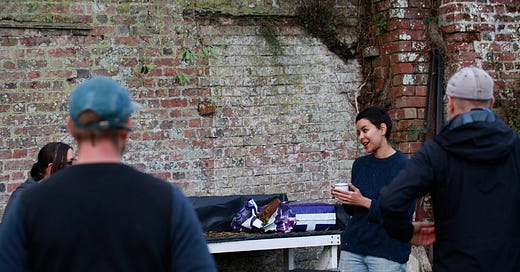I tend to struggle to talk about myself. When people ask me what I do or - worse - what I’ve done, I draw a blank. It’s not just that I worry I come across as not having really done much or not being up to much. In that moment, it feels like it’s really true: I have no accomplishments or experience.
Once when this happened years ago, I was leading a volunteer day at Soul Farm and offering a circle at the start and before lunch for connection. One of our volunteers asked me what my work prior to the farm had been and I clammed up.
A lot of the time people are probably asking merely out of politeness or perhaps out of kindly taking an interest (as I’m sure was the case here). If I’m not in a good place, I can feel as if I’m sitting under their scrutiny, that they’re assessing what qualifies me. “What’s your background?” turns into “Who are you to do this?” Of course, whether or not this is the other person’s subtext, the real issue is that I’m asking myself this question. Who do I think I am? What makes me worthy?
Part of this is without a doubt a neurotype thing. When someone asks me what I’ve been up to this week, I genuinely struggle to remember. I live in the present. Whatever is in front of me is all that exists right now. But working memory isn’t where the panic comes from. I could take a beat and remember that a look through my diary and journals will show that there’s a lot going on.
When we’re unhorsed by other people’s perceptions of us (or what we imagine those perceptions must be) it’s usually because part of us agrees with them. This can go really deep. Culturally, so many of us feel that something is fundamentally wrong with us and so we don’t deserve to belong.
But the contributors can be a lot more surface level. For those of us whose primary work is or has been looking after our children, we’re going to be susceptible to internalising our culture’s disregard for care. Caregiving is usually unpaid or underpaid and so it isn’t valued in a society that weighs everything in money.
The bias against mothers doesn’t help. It cuts both ways, whether a woman works in or out of the home. In her book Sway: Unraveling Unconscious Bias, Dr Pragya Agarwal cites a study which found that “simply being labelled as a ‘mom’ seems to convey that a person is lacking in professional ability” and another which found that “mothers were often more likely than non-mothers to be regarded as poorly motivated to succeed.”
No wonder it feels hard to demonstrate that unpaid caregiving work is just as valuable and that it even contributes positively to paid work.
That time on the farm, one reason I struggled to answer was that at that stage I’d primarily honed my facilitation skills through years as a volunteer breastfeeding supporter and breastfeeding counselor. It was excellent experience and training in holding space and active listening but it didn’t feel valid in a non-mothering context.
Even now, when people ask me this question, I can be more prone to talk about my masters in Early Modern Literature and Culture, my short stint in hyperlocal magazines, my freelance copywriting and social media communications gigs over the years and now my work with Soul Farm. I’m thinking this is what they’ll find more interesting.
But actually, I equally value (or maybe more highly value) the knowledge, wisdom and skills that I’ve learned through being with my children, through home educating, through founding, managing and facilitating a consent-based learning community, through supporting women in the voluntary sector and, in fact, through all my relationships.
A job popped up on my LinkedIn recently which actively encouraged applicants to list unpaid caregiving work in their experience even though the role wasn’t related to caregiving. That felt revolutionary. This work is essential to society. Perhaps when we get better at talking about ourselves and what we do, naming this part of it is a small way of pushing back against a culture that keeps undervaluing care.





So true, thank you for sharing
This really struck a chord with me.Precisely why I’m deeply hesitant to share of myself.
Thank you for bringing these thoughtful observations to light.